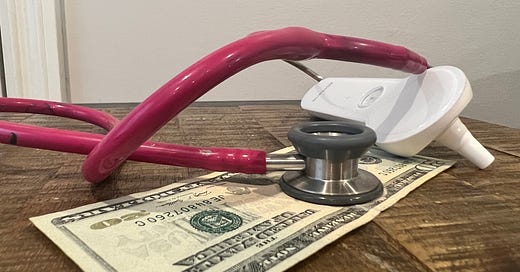Will the doctor “see” you now?
There’s a strange phenomenon that happens when you go to the doctor: for the vast majority of the time you sit and wait and feel like a patient. All of your other identities strip away. You are a person and you need the help and the expertise of this other person. Inevitably, there is a moment where the doctor might casually inquire about what you do when you’re not in the vulnerable state of turning your body over to the fingers and instruments and gazes of a stranger.
“I’m a ____,” you respond, and in that singular moment you are seen as so much more than the sliver that your patient identity ever imbues.
You become a fuller person in the eyes of this individual.
Like the inquiring doctor, general perspectives in America about immigrants too often keep us at that same clinical distance. People spend a lot of time--as general media consumers, as policy makers, as informed citizens--not bothering to know much more about immigrants in this country other than the fact that they exist. There are immigrants all around and they probably do immigrant things. That distance conveniently avoids empathy: if you only know about us in the abstract, our suffering and joy and fears and desires are unknowable and theoretical.
There’s another element to consider about that moment when you are actually seen while you are sitting in a state of discomfort at the doctor’s office: it is really hard to actually get to see a doctor in this country if you are not a tax-paying, “legal” resident.
Expensive too.
You pay for everything. The consultations, the lab work, medical procedures, medication, follow-up appointments. You pay for the time you are not working, since you are effectively losing money. You pay for the risk of being asked for forms of identification from multiple individuals in this process. You pay for second opinions. You pay for the uncertainty of knowing if your diagnosis is being properly described to you since the doctor may speak quickly or may make assumptions about your understanding of English.
Regardless of your status in this country, what kinds of costs do you incur when you are seen by medical professionals?
Financial, Physical, Emotional, and Spiritual Costs
Policymakers in this country love to espouse the costs and burdens immigrants place on an already broken healthcare system. But the costs that individuals labeled as undocumented actually face extend far beyond a dollar value. Over the course of our weekly installments of La Cuenta, we are going to name and tally these costs. The visit to the doctor reminds us that these costs are also opportunities to be seen and for our lives to be reflected in the eyes and hearts of those around us (and we’ll be revisiting moments around healthcare like the one above in more detail in the future).
Each week, we will explore one item added to the metaphorical bill of what undocumented American living costs. Our bill includes a sum of dollars, hours, tears, scars, goodbyes, and discarded opportunities. It is both incomplete and overwhelming.
On Method and Pseudonyms
For quite obvious reasons, we’ll be using pseudonyms for many of the entries in this project. While we may list ourselves—Alix and Antero—as the authors of these posts, as well as our amazing editorial assistant, Laura, the voices and perspectives here come from a growing network of individuals that may be or may have once been labeled as undocumented. Maybe this network includes you.
You can read a little more about us over here.
In the coming weeks, we’re going to go over our research process as well as the story and the families that brought this work into our lives. For the scholarly nerds reading this, we are building on a platica methodology that is intentionally feminist and Chicana in orientation.
Propina
Each week’s installment of La Cuenta will have some kind of extra: a call to action, a resource that might be useful, a song that’s sustaining us, something that loosely anchors us to this moment and to the ways we interact with the world around us.
This week’s propina: an invitation.
La Cuenta was created out of the recognition that we seldom hear from the voices of those society historically marginalizes. Sure, there are plenty of profiles about them—about us. But when do we hear the nuanced understandings, costs, and risks of going to the doctor or of driving on the freeway or of posting to social media or of dating or of trying to finish a college degree? (stay tuned for narratives on all those accounts, btw.)
While we have long term plans for La Cuenta, we also hope that this is a space that includes you. If you are someone who has experienced life in ways that reflect the work we are doing here, please get in touch. We have a modest budget to compensate your time as a writer, artist, photographer, what-have-you.
And if you have ever wondered about aspects of undocumented living or have a suggestion for a future installment, please drop a comment below or send us an email.
Once again, we want to send you a postcard but we need your address. We want to send a postcard to your friends and to networks that might want to be involved in this work too! (For real, calling this a postcard does not do it justice.)
We’ll see you next week.




